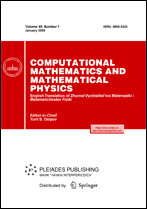|
This article is cited in 23 scientific papers (total in 23 papers)
Stable sequential convex programming in a Hilbert space and its application for solving unstable problems
M. I. Sumin
Nizhni Novgorod State University, pr. Gagarina 23, Nizhni Novgorod, 603950, Russia
Abstract:
A parametric convex programming problem with an operator equality constraint and a finite set of functional inequality constraints is considered in a Hilbert space. The instability of this problem and, as a consequence, the instability of the classical Lagrange principle for it is closely related to its regularity and the subdifferentiability properties of the value function in the optimization problem. A sequential Lagrange principle in nondifferential form is proved for the indicated convex programming problem. The principle is stable with respect to errors in the initial data and covers the normal, regular, and abnormal cases of the problem and the case where the classical Lagrange principle does not hold. It is shown that the classical Lagrange principle in this problem can be naturally treated as a limiting variant of its stable sequential counterpart. The possibility of using the stable sequential Lagrange principle for directly solving unstable optimal control problems and inverse problems is discussed. For two illustrative problems of these kinds, the corresponding stable Lagrange principles are formulated in sequential form.
Key words:
convex programming, parametric problem, perturbation method, stability, sequential optimization, minimizing sequence, Lagrange principle in nondifferential and differential forms, Kuhn–Tucker theorem, duality, regularization, unstable problems.
Received: 02.07.2013
Citation:
M. I. Sumin, “Stable sequential convex programming in a Hilbert space and its application for solving unstable problems”, Zh. Vychisl. Mat. Mat. Fiz., 54:1 (2014), 25–49; Comput. Math. Math. Phys., 54:1 (2014), 22–44
Linking options:
https://www.mathnet.ru/eng/zvmmf9971 https://www.mathnet.ru/eng/zvmmf/v54/i1/p25
|


| Statistics & downloads: |
| Abstract page: | 674 | | Full-text PDF : | 98 | | References: | 71 | | First page: | 15 |
|





 Contact us:
Contact us: Terms of Use
Terms of Use
 Registration to the website
Registration to the website Logotypes
Logotypes








 Citation in format
Citation in format 
